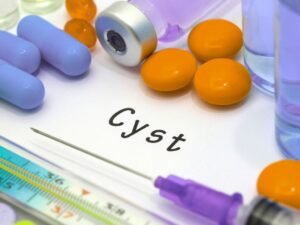An ovarian cyst is a fluid-filled sac which develops in an ovary. Most ovarian cysts are benign (non-cancerous) and cause no symptoms. Some cause problems such as pain and irregular bleeding. Ovarian cyst treatment may vary, as in some types the cyst tends to go away on their own. For other types, surgery may be advised to remove the cyst.
What are the symptoms, problems and possible complications?
Most ovarian cysts are small, benign (non-cancerous), and cause no symptoms. Some ovarian cysts cause problems which may include one or more of the following:
- Pain or discomfort in the lower abdomen, which may be constant or intermittent.
- Pain when you have sex.
- Irregular periods , or the flow may be heavier or lighter than usual.
Sometimes a cyst may bleed into itself, or burst. This can cause a sudden severe pain in the lower abdomen. occasionally, a cyst which is growing on a stalk from an ovary may twist the stalk on itself (a torsion).
This stops the blood flow through the stalk to the cyst and causes the cyst to lose its blood supply, causing sudden severe pain in the lower abdomen.
Large cysts can cause your abdomen to swell, or press on nearby structures. For example, they may press on the bladder or rectum, which may cause urinary symptoms or constipation.
Although most cysts are benign, some types have a risk of becoming cancerous. (see separate leaflet called ‘cancer of the ovary’ for more details.) rarely, some ovarian cysts make abnormal amounts of female (or male) hormones which can cause unusual symptoms.

How is an Ovarian Cyst Diagnosed?
- As most ovarian cysts cause no symptoms, many cysts are diagnosed by chance – for example, during a routine examination, or if you have an ultrasound scan for another reason.
- If you have symptoms suggestive of an ovarian cyst, your doctor may examine your abdomen and perform a vaginal (internal) examination. He or she may be able to feel an abnormal swelling which may be a cyst.
- An ultrasound scan can confirm an ovarian cyst. An ultrasound scan is a safe and painless test which uses sound waves to create images of organs and structures inside your body. The probe of the scanner may be placed on your abdomen to scan the ovaries. A small probe is also often placed inside the vagina to scan the ovaries, to obtain more detailed images. Your doctor may also take a sample of blood.
Ovarian Cyst Treatment
Your specialist will advise on the best course of action. This depends on factors such as your age, whether you are past the menopause, the appearance and size of the cyst from the ultrasound scan and whether you have symptoms.
Observation
Many small ovarian cysts will resolve and disappear over a few months. You may be advised to have a repeat ultrasound scan after a month or so. If the cyst goes away then no further action is needed.
Operation
Removal of an ovarian cyst may be advised, especially if you have symptoms or if the cyst is large. Sometimes the specialist may want to remove it to determine exactly which type of cyst it is and to make sure there are no cancer cells in it. Most smaller cysts can be removed by laparoscopic surgery (keyhole surgery). Some cysts require a more traditional style of operation.
The type of the operation depends on factors such as the type of cyst, your age, whether cancer is suspected or ruled out. In some cases, just the cyst is removed and the ovary tissue preserved. In some cases, the ovary is also removed, and sometimes other nearby structures such as the uterus and the other ovary. your specialist will advise on the options for your individual situation.

Ovarian cyst treatment
Ovarian cysts are typically benign in nature, however it is important to note that most women still at their childbearing age and pre-menopause develop ovarian cysts. Understanding the character of an ovarian cyst is sweet, but it’s additionally necessary to grasp what the impact is on a woman’s body. At first, a straightforward methodology which will not scare the least bit is the careful observation of the cyst; gynaecologist regular checks which will detect if the cyst is growing or it’s reabsorbed. If each young lady would create an ultrasound each half-dozen months or a year, actually at some purpose, several of them would discover that they need an ovarian cyst.
A minority of ladies may also develop carcinoma or malignant ovarian cysts. Usually surgery or chemotherapy is the sole solution which will facilitate touch upon the ovarian cysts that are malignant. These remedies could facilitate the elimination of ovarian cysts, but for many ladies it’s been noted that the ovarian cysts can recur unless corresponding lifestyle changes are created. ovarian cysts that are malignant are a worry to individuals, as a result of the malignancy could rapidly invade alternative organs within the body and cause terribly serious complications.
Ovarian cyst treatment depends much on the scale of the cyst, of its age, the emotions that you simply have within the lower abdomen space – cysts will hurt, they’ll cause urinary disorders, additionally to lunation connected events.
Because of this, ovarian cysts will cause many alternative complications. This is often additionally owing to the symptom-less nature of cysts which means that girls solely resolve late within the method that they need ovarian cysts.
Ovulation happens through a hormonal mechanism and a fast remedy is to require contraception pills. ovulation does not happen therefore an attainable reason behind cyst formation is excluded. Obviously, already fashioned cysts won’t withdraw instantly, however it prevents any forming and it accelerates the method of reabsorption of existing ones.


